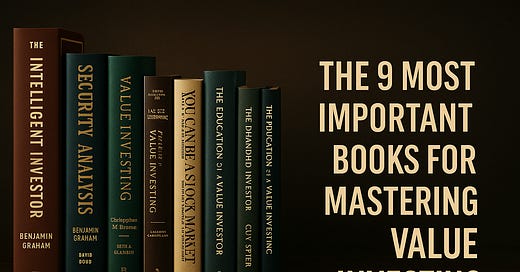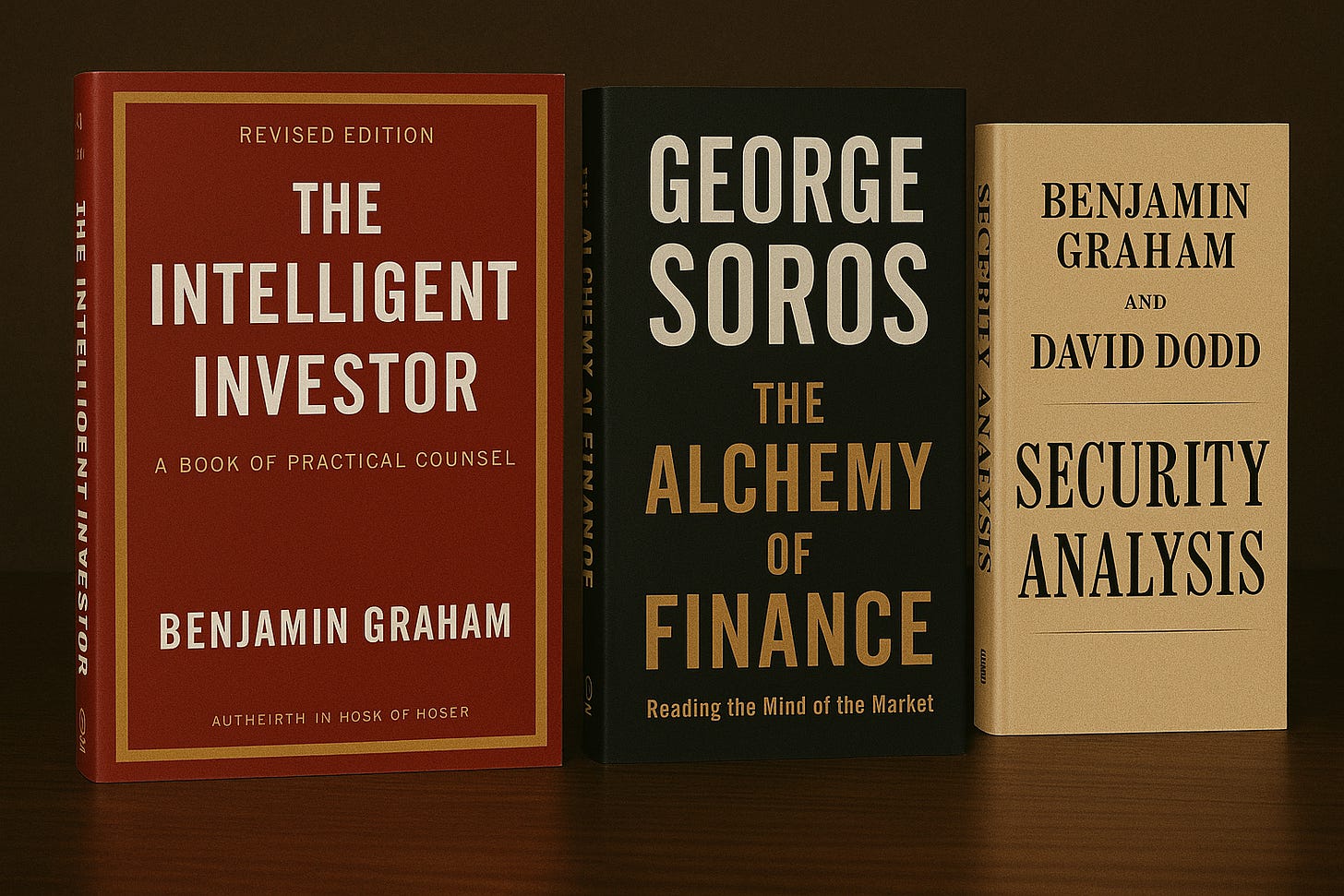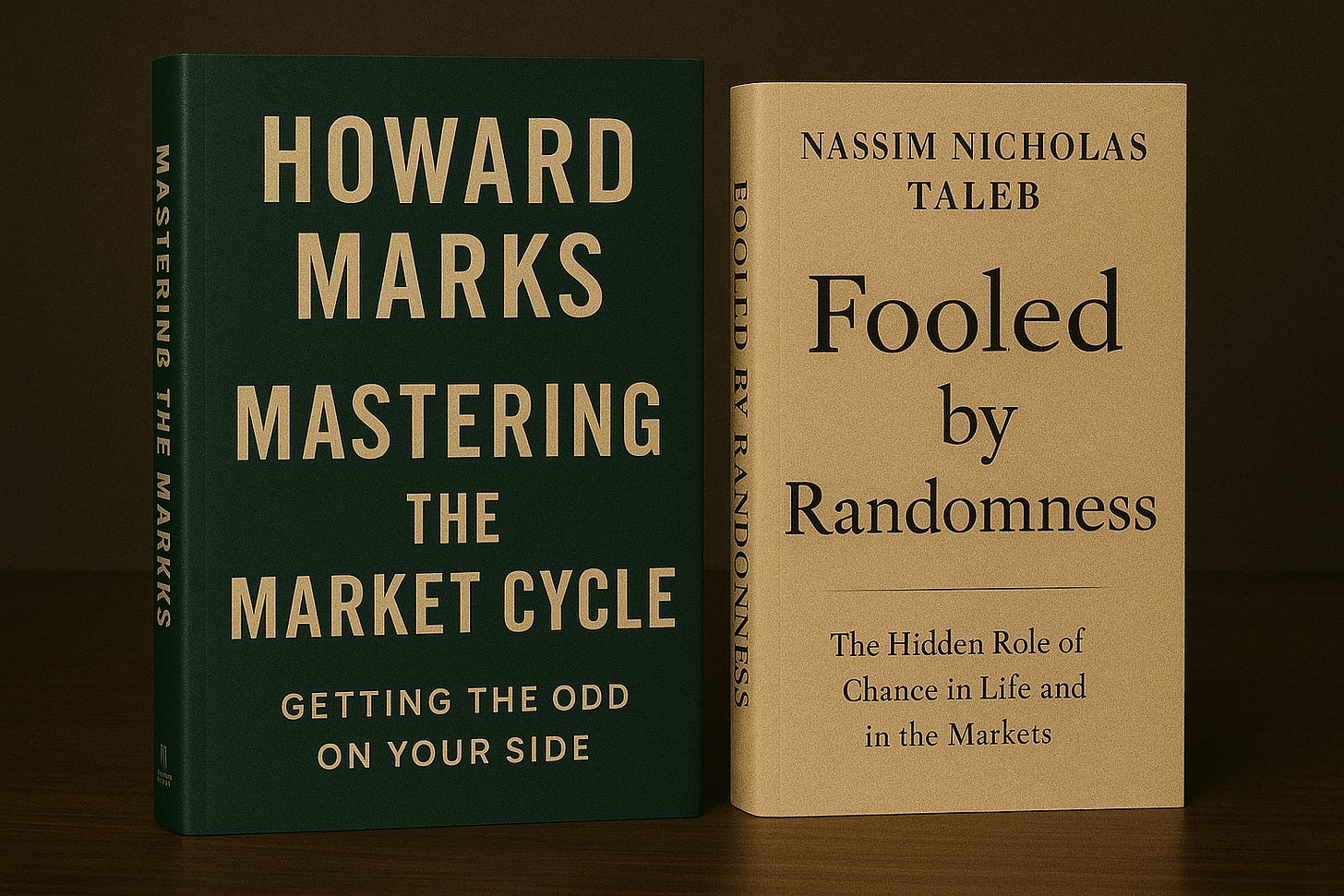What’s Inside?
In this article, we’re diving into 9 must-read books for every value investor. These books are more than enough to give you a strong foundation—from basic to advanced concepts in value investing and finance.
Whether you're just starting out or looking to sharpen your skills, this reading list will level up your investing knowledge. But here’s an important reminder:
“Knowledge without execution is just potential wasted.”
Reading is powerful—but only when you apply what you learn.
So let’s get into it!
We’ll begin with the basics, move on to intermediate, and finally explore the advanced must-reads that every serious value investor should own.
BASIC LEVEL
If you're just starting your investing journey and have no prior knowledge of finance or investing, don’t worry. These two powerful books will help you develop a strong foundation in money management, mindset, and personal finance. Before diving into stock markets, it's essential to first understand how money works—and these books do exactly that.
1. Rich Dad Poor Dad – Robert Kiyosaki
This bestselling classic is a mindset-shifting book that introduces you to the basic principles of wealth creation. It teaches you how to differentiate between assets and liabilities, and explains how the rich view money differently compared to the middle class and the poor.
The book is written in a storytelling format, making complex ideas simple and relatable. It challenges the traditional notion of working for money and instead encourages you to learn how to make money work for you.
This was the first money-related book I read—and it completely transformed how I thought about finances.
2. The Richest Man in Babylon – George S. Clason
This is one of the oldest and most timeless books on personal finance, but its wisdom is still highly relevant today. Through simple parables set in ancient Babylon, it teaches the fundamentals of saving, investing, and growing wealth.
Despite being written nearly a century ago, the principles it offers—like living below your means, investing wisely, and letting your money compound over time—are universal and evergreen.
It’s the perfect guide for anyone who wants to master the basics of financial discipline and wealth creation.
Why These Two Books?
These books won’t teach you how to invest in the stock market, but they will help you build the right mindset and financial habits required to succeed as an investor. They provide the groundwork for managing your money, which is essential before you move on to more advanced investment strategies.
If you're a beginner, these two are non-negotiable. Start here.
Join as a paid subscriber to unlock a whole lot more — including all past premium articles and exclusive access to our WhatsApp group for paid members.
Click the button below to start getting the full benefits ⬇️
Intermediate Level
Once you’ve gained a basic understanding of money and personal finance, it’s time to take the next big step: learning how to invest in the stock market. This stage of your journey focuses on understanding why stock investing is important, how to pick the right companies, and how to analyze them effectively. The following books are perfect for building this essential knowledge.
1. The Peter Lynch Trilogy
Peter Lynch is considered one of the greatest investors of all time. During his time managing the Fidelity Magellan Fund, he achieved extraordinary returns and became a legend on Wall Street. His three books—One Up on Wall Street, Beating the Street, and Learn to Earn—are essential reads for anyone serious about understanding the stock market.
In One Up on Wall Street, Lynch introduces the idea that everyday investors can beat the professionals by simply observing the world around them and identifying great businesses early. Beating the Street takes a deeper dive into how he built his portfolio and offers practical insights into creating your own. Learn to Earn is a beginner-friendly book that breaks down how the economy and markets function in simple terms.
These books teach you:
How to find good stocks using everyday knowledge
What makes a company worth investing in
How to build a successful long-term investing mindset
How Peter Lynch approached investing during his career
🔁 Recommended reading order:
1. One Up on Wall Street → 2. Beating the Street → 3. Learn to Earn
This order helps you progress from stock market basics to real-world investing strategies.
2. Romancing the Balance Sheet
After learning how to identify good companies and understand what makes a business valuable, the next step is to analyze companies in-depth—by looking into their financial statements.
Romancing the Balance Sheet by Dr. Anil Lamba is an excellent guide for beginners who want to learn how to read and interpret a company’s financials. The book breaks down complex financial concepts into simple, relatable examples. It covers key topics such as how to read a balance sheet, how to analyze a profit and loss statement, and what to look for in a cash flow statement.
This book is especially useful for those without a background in finance, as it simplifies the numbers and helps you gain confidence in evaluating a company’s financial health.
If you want to read between the numbers and truly understand a company’s business, this book is a must.
What You’ll Gain from These Books
Together, these four books will equip you with the tools and confidence needed to take your investing journey to the next level. You'll gain a clear understanding of how the stock market works, what truly makes a business great, and how to identify quality companies on your own. More importantly, you’ll learn to analyze financial statements with clarity, giving you the ability to evaluate a company's strength beyond just its stock price. This is the stage where you transition from being a beginner to becoming a confident and informed stock market participant—ready to make well-researched investment decisions.
ADVANCED LEVEL
Once you've built a strong foundation and learned how to evaluate companies, the next step is to upgrade your knowledge to an advanced investor level. The books in this section are not for casual reading—they’re deep, insightful, and designed for investors who want to think independently, understand complex market dynamics, and make confident long-term decisions. These three classics will help shape your thinking like a true professional.
1. The Intelligent Investor by Benjamin Graham
The Intelligent Investor is widely regarded as the Bible of value investing, and for good reason. Written by Benjamin Graham, the legendary investor and mentor to Warren Buffett, this book dives deep into timeless principles like margin of safety, disciplined investing, portfolio diversification, and emotional control.
This isn’t a book you read once and forget.
From my personal experience, every time I revisit it, I discover new insights and perspectives—depending on where I am in my investing journey.
It emphasizes the importance of being an intelligent investor—not necessarily the smartest person in the room, but the most rational, patient, and disciplined.
If you haven’t read this book yet, you're truly missing out on one of the most important lessons in investing history.
2. Security Analysis by Benjamin Graham & David Dodd
If The Intelligent Investor is the beginner-to-intermediate level of Graham's philosophy, then Security Analysis is the graduate course. Co-authored by Benjamin Graham and David Dodd, this book goes into advanced-level detail on how to analyze and value securities, especially during times of market uncertainty.
It covers:
In-depth analysis of stocks and bonds
How to assess a company’s true value
Techniques for examining financial statements, earnings power, and balance sheets
Though dense and technical, it’s a must-read for investors who want to take a professional approach to evaluating businesses and navigating risk. Many of today’s best analysts and fund managers still refer to this book as their investing playbook.
3.The Alchemy of Finance by George Soros
Unlike the first two books which focus on value investing, The Alchemy of Finance offers a macroeconomic and psychological view of the markets. Written by billionaire hedge fund manager George Soros, the book introduces his famous theory of reflexivity—which explains how market participants' perceptions can influence and distort reality.
This book helps you understand:
Why markets fluctuate irrationally
How bubbles are formed and burst
The role of investor psychology in driving volatility
The bigger picture of economics, policy, and market sentiment
It’s not a traditional investing book, but it gives you a broader perspective of how the financial world functions, especially for those interested in global investing, macro trends, and behavioral finance.
By reading these advanced-level books, you’re no longer just following advice—you’re building your own independent thinking and decision-making process. From the disciplined principles of Graham to the big-picture thinking of Soros, these books offer the tools you need to navigate markets at a professional level.
If you commit to reading all the books shared—from basic to advanced—you will become a more informed, rational, and confident investor. This journey isn't just about learning to invest—it's about transforming the way you think about money, risk, and opportunity.
BONUS BOOKS
If you’ve read all the books I’ve shared so far, I highly recommend adding these 2 bonus books to your list. They will further enhance your understanding of how markets behave and how randomness plays a role in investing outcomes.
1. Mastering the Market Cycle by Howard Marks
This book is written by one of the most respected investors in the world, Howard Marks. It teaches you how markets move in cycles — from optimism to pessimism, from greed to fear — and how understanding these patterns can help you make smarter investment decisions. It shows you how to stay rational when others panic and gives you a solid edge by teaching when to be aggressive and when to be cautious in your investment approach.
2. Fooled by Randomness by Nassim Nicholas Taleb
This book helps you understand an often-overlooked concept in investing: luck and randomness. It explains how many investors confuse luck with skill and how random events can heavily influence outcomes in the stock market. After reading this, you’ll start looking at success and failure with a more realistic and humble mindset. It’s a powerful book for developing mental clarity, risk awareness, and better decision-making.
Always keep in mind, the best return-generating asset is not stocks, bonds, gold, or real estate. It’s you.
So never hesitate to spend money on your personal growth. Because the knowledge and mindset you build will pay you back for a lifetime.
And also, comment your favourite book — not necessarily related to investing. It can be from any category. Just drop it below!
Join as a paid subscriber to unlock a whole lot more — including all past premium articles and exclusive access to our WhatsApp group for paid members.
Click the button below to start getting the full benefits ⬇️
NOTE: This WhatsApp group is not for recommendations on buying or selling financial instruments; it is solely for educational purposes.
{Caution: This article is for educational purposes only, Please consult a SEBI-registered investment advisor before making any investment decisions. This analysis is solely aimed at teaching the fundamentals of company analysis. }








I am surprised that I didn't see 'The Psychology of money' in this list. Is there a specific reason?
Thank you for the recommendations bro.
You are doing a great work, god bless you.
Have read 8/11 books you recommended and will do the remaining three soon.
My book recommendation would be
In Investing - What I learned about investing from Darwin -- Pulak Prasad
Psychology - Thinking, Fast and Slow -- by Daniel Kahneman
Health genre - Heal your gut mind and emotions -- Dimple Jangda.